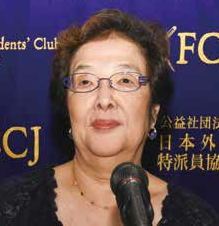Issue:
Queen of the (subtitled) screen
The country’s most famous writer of film subtitles played to a full, star struck crowd at a recent dinner event
By Gavin Blair
THERE CAN BE FEW countries in the world where a movie subtitler is a household name. Thanks to Natsuko Toda, 83, Japan is one such a rarity. Having produced the subtitles for well over 1,500 films, as well as performing interpreter duties for visiting directors and actors, Toda’s name is a regular fixture on movie posters, and she has come to be something of a celebrity in her own right.
At a packed dinner talk show at the Club on Sept. 12, the sprightly Toda had the mostly older Japanese audience eating out of her hand as she entertained with anecdotes and insights from her many decades in the business. “I thought only about 10 people would show up,” opened Toda, laying on the modesty. “And it’s usually women who want to do subtitling that come to hear me talk, so I’m surprised to see so many men here.”
Japan has traditionally been one of the few countries where audiences choose subtitled imported films over dubbed versions, with some territories only releasing the latter, noted Toda. But Japanese audiences want to hear the original voices of their favorite stars, she said. “When I began to watch films after the war and there weren’t many released because of the situation at the time everything was subtitled,” she recalled.

SHE WENT ON TO suggest that one reason younger audiences may have gravitated toward dubs in recent decades was a decline in the ability to read and comprehend kanji quickly enough. Another shift over the years has been the growing number of titles rendered into katakana rather than creating Japanese interpretations of film names. Toda pointed to David Lean’s Summertime starring Audrey Hepburn, which was released in Japan in 1955 under the title Ryojo, meaning a person’s mood while traveling. “Such an elegant title wouldn’t be used today, it would almost certainly be released as Samataimu in katakana, because everybody understands that now,” rued Toda.
When Toda was trying to break into the industry, there were about ten subtitlers, all male, who dominated the business. She began working at a film distributor, gaining experience by doing small pieces of translation work. “I had studied English through school and college, but had never really spoken English until I was about thirty, everything was on paper. Then I was suddenly asked to interpret for an actor who was coming from Hollywood. I was terrible and thought I would get fired, but there were few people around who could do it,” said Toda. She went on to say that she is still not confident in her interpreting ability and prefers to work on subtitles.
Toda began to get movie subtitling work in her thirties, but was not able to make a living at it until her forties. Toda explained the tight deadlines that subtitlers work to, usually having just a week to ten days to complete a movie, sometimes from a version that is still being edited.
“YOU GET THE CALL and are then sent a script. There’s no way I can decipher gangsters’ accents in movies, for example, so the English text is essential. There is basically no time for research on the background or history of the story,” she explained.
While working within such time restraints, the biggest challenges are shortening dialogue to fit on the screen and rendering jokes, especially wordplays, into Japanese, according to Toda. “People can read about three characters per second, and audiences don’t come to the cinema to read the subtitles, but to watch the film, so they have to be short,” she said.
Toda then recounted how she translated a play on words from a recent Bond film, to spontaneous applause from the room. This was followed by the screening of scenes from The Godfather and Mission Impossible, with attendees challenged to translate small chunks of dialogue from each. After a few brave attempts from the crowd, Toda revealed her versions; cue more applause.
During an extended Q&A session, Toda was asked about everything from the most handsome Hollywood stars she had worked with to the biggest prima donnas but diplomatically demurred from naming names. She repeatedly emphasized that a movie must be subtitled by a single person to guarantee consistency of style and expressions, perhaps in response to rumors that she has outsourced work on some films.
Despite her dominance in the Japanese film industry, she has not been without her critics. Toda was taken off the subtitles for Full Metal Jacket after director Stanley Kubrick got wind that the profanity in the film was being watered down. After the first Lord of the Rings film, a group of Japanese Tolkien fans petitioned the local distributor about what they claimed were mistakes in subtitles caused by a lack of familiarity with the source material.
Asked about how technology will change subtitling, Toda suggested it will have little effect, even though automated systems are already being tested. “But then I never imagined actual film would disappear and be replaced by digital,” she acknowledged.
Gavin Blair writes for publications in Asia, Europe and the US.

